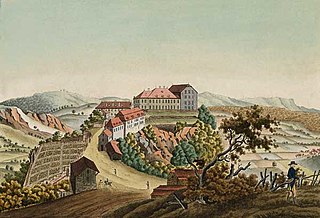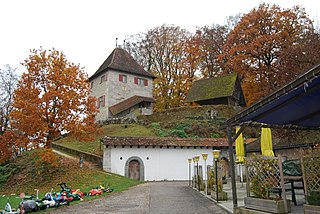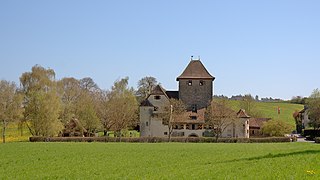
The Bailiff's Castle (German : Landvogteischloss) is a castle in the municipality of Willisau of the Canton of Lucerne in Switzerland. It is a Swiss heritage site of national significance. [1]

The Bailiff's Castle (German : Landvogteischloss) is a castle in the municipality of Willisau of the Canton of Lucerne in Switzerland. It is a Swiss heritage site of national significance. [1]
Lörrach is a Landkreis (district) in the southwest of Baden-Württemberg, Germany. Neighboring districts are Breisgau-Hochschwarzwald and Waldshut. To the west it borders the French département Haut-Rhin; to the south the Swiss cantons Basel-Stadt, Basel-Landschaft and Aargau.

Trachselwald District is a district in the canton of Bern, Switzerland. From 1 January 2010, the district lost its administrative power while being replaced by the Emmental, whose administrative centre is Langnau im Emmental. Since 2010, it remains therefore a fully recognised district under the law and the Constitution of the Canton of Berne. Its governor's seat was in Trachselwald Castle in Trachselwald. It consistes of 10 municipalities within an area of 191 km².

Feldschlösschen is a Swiss beverage and brewing company located in Rheinfelden, in the German-speaking canton of Aargau, Switzerland.

Meggenhorn Castle is a castle in Meggen near the Swiss city of Lucerne. It was built in 1868/70 by Edouad Hofer-Grosjean from Mulhouse and in 1926 equipped with a Welte Philharmonic Organ. It is surrounded by vineyards and is considered to be the municipality's symbol. Today, it is mostly used as a tourist attraction and reception venue. It is a Swiss heritage site of national significance.

Thorberg Castle is a former Carthusian monastery, or charterhouse, now a prison, located in Krauchthal in the Canton of Bern, Switzerland.

Gottlieben Castle is a castle in the municipality of Gottlieben in the canton of Thurgau in Switzerland. It is a Swiss heritage site of national significance.

Buchegg Castle is a castle in the Swiss municipality of Kyburg-Buchegg in the canton of Solothurn, Switzerland.

Flaach Castle is a castle in the municipality of Flaach in the Swiss canton of Zurich. It is a Swiss heritage site of national significance.

Greifensee Castle is a castle in the municipality of Greifensee and the canton of Zurich in Switzerland. It was probably built by the House of Rapperswil and is a Swiss heritage site of national significance.

Wart Castle is a castle in the municipality of Neftenbach and the canton of Zurich in Switzerland. It is a Swiss heritage site of national significance.

Hegi Castle is a castle in the city of Winterthur of the canton of Zurich in Switzerland. It is a Swiss heritage site of national significance.

Steinbrugg Castle is a castle in the municipality of Solothurn of the Canton of Solothurn in Switzerland. It is a Swiss heritage site of national significance.
Souaillon Castle is a castle in the municipality of Cornaux of the Canton of Neuchâtel in Switzerland. It is a Swiss heritage site of national significance.

Jeanjaquet Castle is a castle in the municipality of Cressier of the Canton of Neuchâtel in Switzerland. It is a Swiss heritage site of national significance.

Asuel Castle is a ruined castle near Asuel, in the municipality of La Baroche of the Canton of Jura in Switzerland. It is a Swiss heritage site of national significance.
Montvoie Castle is a castle in the municipality of Clos du Doubs of the Canton of Jura in Switzerland. It is a Swiss heritage site of national significance.

Porrentruy Castle is a castle in the municipality of Porrentruy of the Canton of Jura in Switzerland. It is a Swiss heritage site of national significance.

Salenegg Castle is a castle in the municipality of Maienfeld of the Canton of Graubünden in Switzerland. It is a Swiss heritage site of national significance.

Thunstetten Castle is a castle in the municipality of Thunstetten of the Canton of Bern in Switzerland. It is a Swiss heritage site of national significance.
Wangen an der Aare Castle is a castle in the municipality of Wangen an der Aare of the Canton of Bern in Switzerland. It is a Swiss heritage site of national significance.
47°07′10″N7°59′26″E / 47.119313°N 7.990534°E